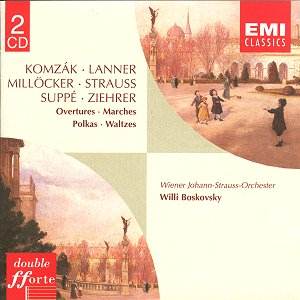


KOMZÁK, LANNER, MILLÖCKER, STRAUSS, SUPPÉ, ZIEHRER
Overtures, Marches, Polkas and Waltzes
Franz von SUPPÉ (1819-1895)
Overture: Ein Morgen, ein Mittag und ein Abend in Wien (1844)
Overture: Boccaccio (1879)
Overture: Leicht Kavallerie (1866)
Overture: Dichter und Bauer (1846)
Marsch: Fatinitza
Karel KOMZÁK (1850-1905)
Walzer: Bad'ner Mad'ln (1890s)
Walzer: An der schönen grunen Narenta (1890s)
Fideles Wien
Marsch: Echtes Wiener Blut
Marsch: Erzherzog Albrecht (1877)
Carl Michael ZIEHRER (1843-1922)
Overture: Die Landstreicher
Marsch: Hoch und Nieder
Polka: Loslassen
Walzer: Faschingskinder
Schönfeld-Marsch (1890)
Walzer: Weaner Mad'ln
Polka: Das liegt bei uns im Blut
Johann STRAUSS II (1825-1899)
Overture: Blindekuh (1878)
Overture: Eine Nacht in Venedig (1883)
Josef STRAUSS (1827-1870)
Walzer: Perlen der Liebe (1857)
Joseph LANNER (1801-1843)
Walzer: Abendsterne (1841)
Walzer: Jagd-Galoppe
Walzer: Die Romantiker (1841)
Carl MILLÖCKER (1842-1899)
Walzer: Carletta
Traum-Walzer (1894)
Polka: Postscriptum
![]() Wiener Johann-Strauss-Orchestra/Willi
Boskovsky
Wiener Johann-Strauss-Orchestra/Willi
Boskovsky
rec. May 1971, May and Oct 1972, Redoutensaal, Hofburg; Simmeringer Hof,
Vienna. ADD
![]() EMI CLASSICS DOUBLE
FFORTE 5 75676 2 [78.29+77.49]
EMI CLASSICS DOUBLE
FFORTE 5 75676 2 [78.29+77.49]
BUY NOW